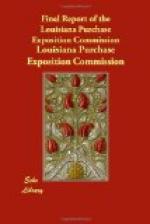indeed, with wives and children and family life,
and it was so, and it has ever been so since Cadillac
willed it. When La Salle was killed in his
second journey to the Mississippi in 1687, he had with
him his brother and two nephews. The newcomers
soon discovered that the region was not the metallic
eldorado they had heard of it in Europe, but that
it was a matchless agricultural country, and they
began cutting the trees and tilling the ground, with
none of the modern instruments and helps, no harvesting
machines from “Chicago,” as the then
desert spot was called in their days; no horses,
no horned cattle. They led, indeed not in fiction,
but in truth—and long before the famous
“Mariner of York” was wrecked by the
Orinoco River—the life of Robinson Crusoe.
Unknown to Europe, far from any neighbors, by the
shade of the pathless forest, they tried their
best. They died, many of them obscurely,
leaving no name to be engraved on the bronze tables
of history, but leaving better than a mere name—families,
many of which still subsist; better than families—examples
of earnestness and endurance, creating a tradition
which will never die out, “Rien ne se perd.”
The greatness of their difficulties, the scantiness of their means, the wisdom of many of their views are equally striking. More than one did their utmost to teach and improve their Indian neighbor. They forbade at an early date the selling to them of the destructive “fire water.” Cadillac did so from the first; the Marquis de Vaudreuil reissued the same orders later. They soon discovered that the northern regions alone could produce wheat enough to feed the whole country, “though it should be quite peopled down to the sea.” The question of labor was one of prominent difficulty and importance. Should it be hired labor of freemen or the compulsory labor of the imported negro? On this, one of those early French explorers, Charlevoix, summed up his opinion in the following memorable sentence: “Hired servants should be preferred. When the time of their service is expired they become inhabitants and increase the number of the King’s natural subjects, whereas the slaves are always strangers. And who can be assured that by continually increasing in our colonies they will not one day become formidable enemies? Can we depend upon slaves who are only attached to us by fear and for whom the very land where they are born has not the dear name of mother country?”
More striking than all was the observation of a Frenchman who never visited America, except in thought, but saw distinctly its future. When no one yet believed it, that great economist and statesman, Turgot, said: “America one day will be free.”
Years went on. The dark shadows and splendid rays of light with which French history is interwoven shone and vanished in their grand and awful alternance. One day the French flag was lowered in Louisiana; that was at the close




